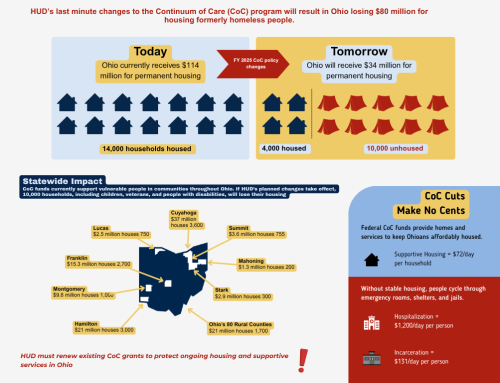Bill Faith, executive director of the Coalition on Homelessness and Housing in Ohio, issued the following statement in response to President Trump’s proposed 18.3 percent cut to the U.S. Department of Housing and Urban Development.
“Dr. Carson often talks about how decent, affordable housing is essential for people’s health and well-being. Unfortunately, his boss’s new budget is bad medicine at a time when more and more Ohioans are struggling to pay the rent,” Faith said. “Cutting HUD will increase housing insecurity and homelessness, which has negative health consequences and other bad outcomes for Ohio.”
President Trump’s Fiscal Year 2019 budget would cut HUD by $8.8 billion, or 18.3 percent, according to an analysis by the National Low Income Housing Coalition. Under this proposal, Ohio would lose an estimated 8,411 Housing Choice vouchers which keep low-income working families, seniors, and people with disabilities stably housed. The budget would also raise rents and impose work requirements on people with rental assistance.
“This budget revives out-of-date, inaccurate stereotypes of poor people. The fact is, nearly 90 percent of households with rental assistance are elderly, disabled, or already working,” Faith said. “The problem is not that people with housing assistance don’t work. It’s that working people can’t afford housing without assistance in this low-wage, part-time economy.”
The federal budget also scraps Veterans Assistance Supportive Housing (VASH) vouchers, a joint program between HUD and the U.S. Department of Veterans Services that has helped reduce veteran homelessness in Ohio by over 30 percent over the past five years.
The president’s proposed cuts are especially outrageous given the fact that Congress just recently lifted austere spending caps that provide an additional $131 billion for domestic non-defense programs, like HUD. That’s why COHHIO has launched the Ohio Homes, Ohio Voices campaign to generate support for increasing federal investment in homeless and housing programs – not cutting it.
An analysis by the Center on Budget and Policy Priorities shows the budget includes several other reductions in federal funding for Ohio’s low-income housing needs:
- Eliminates $137 million in Community Development Block Grants to Ohio;
- Cuts $125 million for Ohio’s public housing and shifts capital needs to the state and local governments;
- Eliminates $38 million in HOME funds for Ohio’s low-income communities;
- Eliminates the National Housing Trust Fund, which provided $5.5 million to Ohio in 2017.
The proposed cuts come at a time when housing costs are rising much faster than Ohioans’ income. A recent report shows that tenants need to earn at least $15 an hour to afford a basic two-bedroom apartment. However, the average renter in Ohio earns only $12.87.








